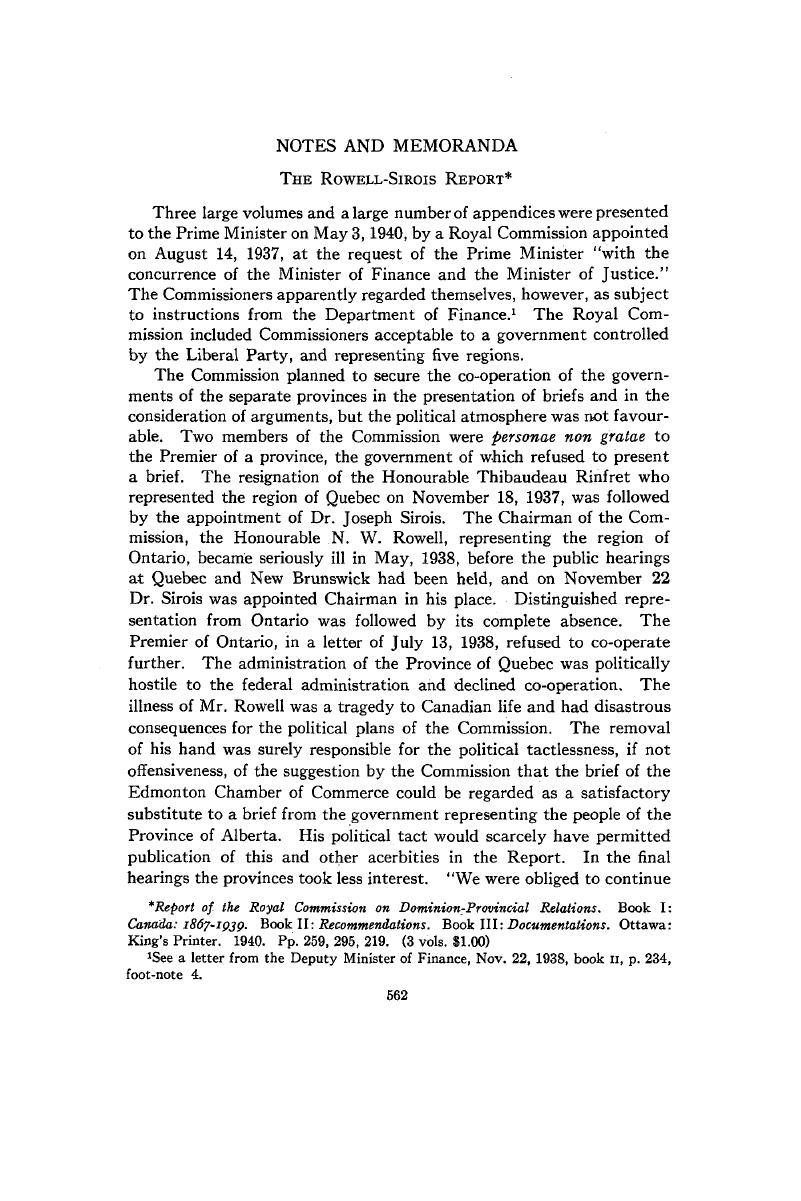Article contents
The Rowell-Sirois Report*
Published online by Cambridge University Press: 07 November 2014
Abstract

- Type
- Notes and Memoranda
- Information
- Canadian Journal of Economics and Political Science/Revue canadienne de economiques et science politique , Volume 6 , Issue 4 , November 1940 , pp. 562 - 571
- Copyright
- Copyright © Canadian Political Science Association 1940
Footnotes
Report of the Royal Commission on Dominion-Provincial Relations. Book I: Canada: 1867-1939. Book II: Recommendations. Book III: Documentations. Ottawa: King's Printer. 1940. Pp. 259, 295, 219. (3 vols. $1.00)
References
1 See a letter from the Deputy Minister of Finance, Nov. 22, 1938, book II, p. 234, foot-note 4.
2 Cited in Clokie, H. M. and Robinson, J. W., Royal Commissions of Inquiry (Stanford University, 1937), p. 80.Google Scholar
3 “The enemies of this object—the people who want to act quickly—see this very distinctly: they are forever explaining that the present is ‘an age of committees,’ that the committees do nothing, that all evaporates in talk. Their great enemy is parliamentary government: they call it, after Mr. Carlyle, the ‘national palaver’; they add up the hours that are consumed in it and the speeches which are made in it, and they sigh for a time when England might again be ruled, as it once was, by a Cromwell,—that is, when an eager absolute man might do exactly what other eager men wished, and do it immediately. All these invectives are perpetual and many-sided; they come from philosophers each of whom wants some new scheme tried, from philanthropists who want some evil abated, from revolutionists who want some old institution destroyed, from new era-ists who want their new era started forthwith: and they all are distinct admissions that a polity of discussion is the greatest hindrance to the inherited mistake of human nature,—to the desire to act promptly, which in a simple age is so excellent, but which in a later and complex time leads to so much evil” ( Bagehot, Walter, Physics and Politics in The Works of Walter Bagehot, Hartford, 1889, vol. IV, p. 569).Google Scholar
4 Maxwell, J. A., Federal Subsidies to the Provincial Governments in Canada (Cambridge, 1937).CrossRefGoogle Scholar The author deplores the tactics involved but fails to appreciate the importance of political activity.
5 See also the difficulties of party leaders after 1896 and the problems of SirBorden, Robert (Robert Laird Borden: His Memoirs, Toronto, 1938).Google Scholar
6 See also Reynolds, L. G., The Control of Competition in Canada (Cambridge, 1940)CrossRefGoogle Scholar; Logan, H. A., “Labor Costs and Labor Standards” (Labor in Canadian-American Relations, Toronto, 1937).Google Scholar
7 A Submission on Dominion-Provincial Relations and the Fiscal Disabilities of Nova Scotia within the Canadian Federation (Halifax, 1934).Google Scholar
8 See MacGregor, D. C., “The Provincial Incidence of the Canadian Tariff” (Canadian Journal of Economics and Political Science, vol. I, 1935, pp. 384–95)CrossRefGoogle Scholar; also W. A. Mackintosh, appendix 3, chap. VII.
- 4
- Cited by


